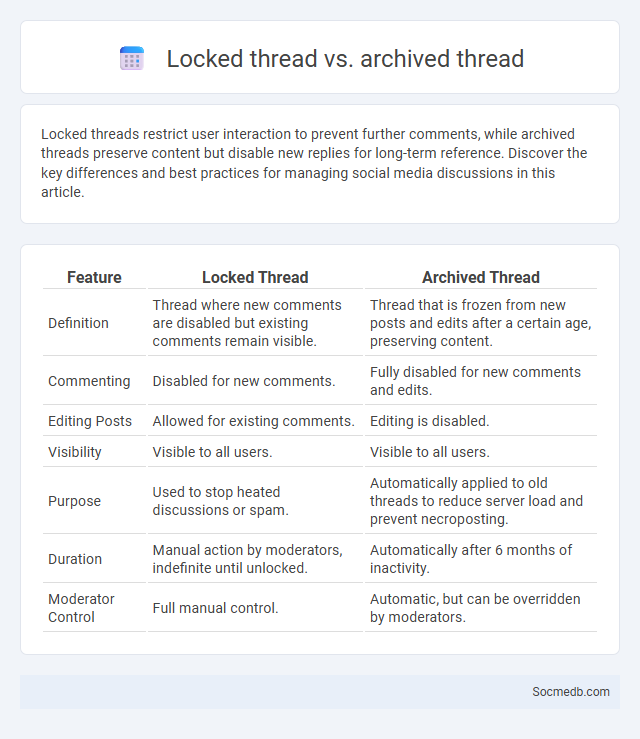
Photo illustration: Locked thread vs Archived thread
Locked threads restrict user interaction to prevent further comments, while archived threads preserve content but disable new replies for long-term reference. Discover the key differences and best practices for managing social media discussions in this article.
Table of Comparison
| Feature | Locked Thread | Archived Thread |
|---|---|---|
| Definition | Thread where new comments are disabled but existing comments remain visible. | Thread that is frozen from new posts and edits after a certain age, preserving content. |
| Commenting | Disabled for new comments. | Fully disabled for new comments and edits. |
| Editing Posts | Allowed for existing comments. | Editing is disabled. |
| Visibility | Visible to all users. | Visible to all users. |
| Purpose | Used to stop heated discussions or spam. | Automatically applied to old threads to reduce server load and prevent necroposting. |
| Duration | Manual action by moderators, indefinite until unlocked. | Automatically after 6 months of inactivity. |
| Moderator Control | Full manual control. | Automatic, but can be overridden by moderators. |
Understanding Thread Management in Online Forums
Thread management in online forums involves organizing and moderating discussions to ensure clarity and relevance, enhancing user engagement and content discoverability. Effective thread management includes categorizing topics, merging similar threads, and enforcing forum rules to prevent spam and off-topic posts. Advanced features like thread locking, pinning, and splitting improve navigation and maintain a structured conversation flow for community members.
What is a Locked Thread?
A locked thread on social media is a conversation or post that has been restricted by moderators or administrators to prevent further comments or interactions. This feature is commonly used to stop spam, control heated discussions, or preserve the integrity of important announcements. Locked threads still allow users to view content but disable new replies or edits.
What is an Archived Thread?
An archived thread on social media is a conversation or series of posts that have been saved and removed from the main feed or active view to preserve content without deleting it. These threads retain all original comments and interactions, allowing users to revisit past discussions while keeping the current feed uncluttered. Archiving threads helps manage information overload and maintain organization within social media platforms like Twitter, Facebook, and Reddit.
Key Differences: Locked vs Archived Threads
Locked threads on social media prevent any new comments or interactions, ensuring content remains static and unaltered, while archived threads are hidden from the main feed but still accessible for review and reference. Your ability to engage with locked threads is restricted, maintaining discussion closure, whereas archived threads allow for preservation without active participation. Understanding these distinctions helps manage content visibility and user interaction effectively.
Why Forums Use Locked Threads
Forums use locked threads to maintain order and prevent further posts in discussions that have reached a conclusion or violated community guidelines. Locking threads helps moderators control spam, reduce off-topic comments, and preserve the integrity of high-quality content. This practice enhances user experience by signaling that no additional input is needed or allowed, ensuring forums remain focused and relevant.
When Are Threads Archived?
Threads are typically archived after a period of inactivity, often ranging from 30 to 90 days depending on the platform's specific policies. Archived threads are stored securely but removed from the main view to declutter active conversations while preserving information for future reference. Users may access archived threads through their account settings or archive sections, ensuring important discussions remain retrievable without occupying active space.
User Permissions in Locked and Archived Threads
User permissions in locked and archived threads restrict the ability to post new messages or edit existing content, ensuring conversation integrity and preventing spam. Locked threads prevent any further contributions while allowing users to view the content, maintaining a read-only environment. Archived threads typically disable all interactions entirely, including commenting and liking, preserving discussion for reference without ongoing user engagement.
Content Accessibility: Locked vs Archived
Content accessibility on social media varies significantly between locked and archived posts, impacting user engagement and reach. Locked content restricts visibility to a select audience, enhancing privacy but limiting interactions, while archived content removes posts from public view without deleting them, preserving your digital footprint for later use. Optimizing your strategy by understanding these differences ensures your social media content remains accessible and effective for your target audience.
Impacts on Forum Moderation and Community Engagement
Social media platforms have transformed forum moderation by necessitating advanced AI tools to manage large-scale user interactions and enforce community guidelines effectively. Enhanced moderation techniques reduce harmful content and foster safer, more inclusive environments that promote positive community engagement. User participation increases as transparent policies and real-time content monitoring build trust and encourage constructive discussions.
Best Practices for Managing Threads in Online Communities
Effective management of threads in online communities requires consistent moderation to maintain relevance and prevent spam, ensuring discussions remain constructive and on-topic. Implementing clear guidelines and employing tools like pinned posts or thread merging enhances user navigation and engagement by organizing information coherently. Prompt responses and community involvement foster a respectful environment, encouraging diverse contributions and sustaining active participation over time.
 socmedb.com
socmedb.com